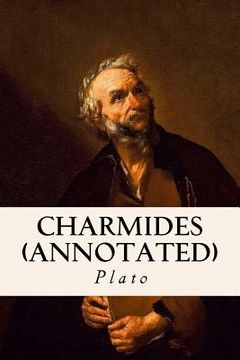Synopsis "Charmides (annotated) (in English)"
Charmides is a classic Greek philosophy work by Plato. In Plato's writings there is both unity, and also growth and development; but that we must not intrude upon him either a system or a technical language. Translated by Benjamin Jowett. Socrates narrates the dialogue, and says that he has just returned from a battle at Potidaea, a city besieged and conquered by the Athenians at the beginning of the Peloponnesian War. Socrates says that, shortly after returning home, he again sought out his habitual conversations by heading to the palaestra of Taureas, a wrestling school where boys gathered. With the help of Chaerephon, who pushes him for details about the battle, he finds his way to Critias and asks him about affairs at home, the present state of philosophy, and whether any of the boys had distinguished himself for wisdom or beauty, or both. Critias answers that Socrates will soon get to know the beauties firsthand, for Charmides and his entourage have just arrived. Critias tells Socrates that Charmides is his cousin, son of his uncle Glaucon. Chaerephon rushes over and asks Socrates if the boy is not beautiful, and Socrates agrees. Chaerephon says suggestively that if Socrates could see his naked form, he would forget all about his handsome face. Socrates says all this will be good and well if the boy also has a noble soul. Socrates tells Critias that before they look at his body, they will ask the boy to strip and show them his soul. Charmides was Plato's uncle, his mother's brother. Critias, Socrates' other interlocutor, was Charmides' first cousin, making Plato Critias' first cousin once removed. Both Critias and Charmides went on to become important members of the Thirty Tyrants, the short-lived oligarchic regime that was established following Athenian defeat in the Peloponnesian War in 404 BCE, making the question of their sophrosyne, or moderation, alternatively ironic or pressing. Socrates tells Critias that there would be no shame in his just talking to the beautiful and popular boy, even if he were younger than he is. Socrates informs the reader that Critias is the child's guardian or caretaker one to whom the charge of anything is entrusted) (155a). Critias agrees and tells an attendant to tell Charmides to come and see the physician ("iatros") about an illness that Charmides has complained about. Critias suggests that Socrates pretend to know a cure for a headache to lure the boy over. Charmides first suggests that sophrosyne is a kind of quietness (159b). Socrates talks him out of this, and Charmides proposes that sophrosyne is the same as modesty. Socrates says this can't be right because Homer (whose authority they both accept on this point) says that modesty is not good for all people, but it is agreed that sophrosyne is (160e). Charmides proposes that temperance is minding your own business. Socrates finds this particularly offensive, and tells Charmides that he must have heard this from some fool (162b). Socrates can tell from the uneasy look on Critias face that this was his idea, and they exchange some words. Socrates says to him testily that at his age, Charmides can hardly be expected to understand temperance (162e). At this point in the argument, Critias takes up the argument with Socrates suggesting that temperance might be the same as self-knowledge. Socrates confesses as they discuss this that his motive in refuting Critias is to examine himself, that he pursues the argument for his own sake.

